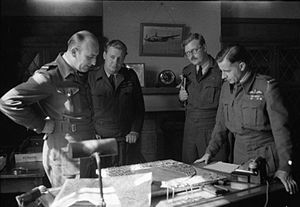Basil Embry
| Sir Basil Edward Embry | |
|---|---|

Embry (right), Air Officer Commanding No. 2 Group, with his staff
|
|
| Born |
28 February 1902 Gloucestershire, England |
| Died | 7 December 1977 (aged 75) Boyup Brook, Western Australia |
| Allegiance | United Kingdom |
| Service/branch | Royal Air Force |
| Years of service | 1921–56 |
| Rank | Air Chief Marshal |
| Commands held |
Allied Air Forces Central Europe (1953–56) Fighter Command (1949–53) No. 2 Group (1943–45) RAF Wittering (1940–41, 1942) No. 107 Squadron (1939–40) No. 20 Squadron (1937–38) |
| Battles/wars | |
| Awards |
Knight Grand Cross of the Order of the Bath Knight Commander of the Order of the British Empire Distinguished Service Order & Three Bars Distinguished Flying Cross Air Force Cross Mentioned in Despatches (4) Commander of the Legion of Honour (France) Croix de guerre (France) Commander 1st Class of the Order of the Dannebrog (Denmark) Grand Officer with Swords of the Order of Orange Nassau (Netherlands) |
| Other work | Sheep farmer |
Air Chief Marshal Sir Basil Edward Embry, GCB, KBE, DSO & Three Bars, DFC, AFC (28 February 1902 – 7 December 1977) was a senior Royal Air Force commander. He was Commander-in-Chief of Fighter Command from 1949 to 1953.
Basil Embry was born in Gloucestershire, England, in 1902 and as a young boy at Bromsgrove School he developed an avid interest in aviation. In 1921 he joined the Royal Air Force with a short service commission as an Acting Pilot Officer. In 1922 he was sent into Iraq, serving under future Air Marshals Arthur Harris and Robert Saundby. By 1926 Embry's enthusiasm, professional application, boundless energy and flair for the unconventional had put him on the fast track for promotion within the RAF, and he was rewarded with the Air Force Cross in that year's New Year Honours, and appointment to a permanent commission.
Promoted to flight lieutenant, Embry returned to Britain in 1927 as an instructor at the Central Flying School, Uxbridge.
...
Wikipedia
